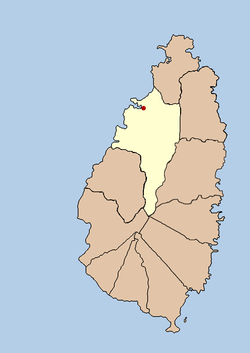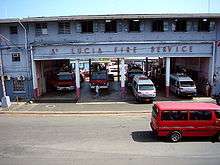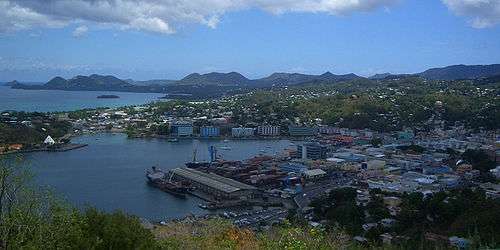Castries
| Castries | |
|---|---|
| City | |
|
Castries | |
| Motto: Statio Haud Malefida Carinis ("A Safe Harbour for Ships")[1] | |
 The Quarter of Castries, showing Castries city (red dot) | |
| Coordinates: 14°01′N 60°59′W / 14.017°N 60.983°WCoordinates: 14°01′N 60°59′W / 14.017°N 60.983°W | |
| Country |
|
| Quarter | Castries Quarter |
| Founded | 1650 as "Carenage" |
| Renamed | 1756 as "Castries" |
| Founded by | the French |
| Named for | Charles Eugène Gabriel de La Croix, marquis de Castries |
| Government | |
| • Governing body | Castries City Council |
| Area | |
| • Total | 79 km2 (30.5 sq mi) |
| Elevation[2] | 2 m (6.56 ft) |
| Population (2013) | |
| • Total | 70,000 |
| • Density | 890/km2 (2,300/sq mi) |
| Time zone | Eastern Caribbean Time Zone (ECT) (UTC-4) |
| Area code(s) | 758 |
| HDI (2006) | 0.814 – high |
Castries ![]() i/ˈkæstriːz/, population 20,000, aggl. 53,639, is the capital and largest city of Saint Lucia, a country in the Caribbean. The quarter with the same name had a population of 70,000 on 22 May 2013 and stretches over an area of 30.5 square miles (79 km2).
i/ˈkæstriːz/, population 20,000, aggl. 53,639, is the capital and largest city of Saint Lucia, a country in the Caribbean. The quarter with the same name had a population of 70,000 on 22 May 2013 and stretches over an area of 30.5 square miles (79 km2).
Castries is in a flood gut and is built on reclaimed land. It houses the seat of government and the head offices of many of foreign and local businesses. The city's design is in a grid pattern. Its sheltered harbour receives cargo vessels, ferry boats, and cruise ships. It houses duty-free shopping facilities such as Point Seraphine and La Place Carinage. Many restaurants offer menus from local to Chinese. Supermarkets and other shopping facilities provide goods. The city is well served by a bus system and taxi service.
St Lucia's main post office is in Castries. Because most parts of the country do not use standard street addresses, mail is largely sent to P.O. boxes. Any mail sent without a town name ends up in the Castries post office.
Castries is the birthplace of Arthur Lewis, winner of the 1979 Nobel Memorial Prize in Economics.
History
Castries was founded by the French in 1650 as "Carénage" (meaning "safe anchorage") when St. Lucia was purchased by Jacques Dyel du Parquet, the governor of Martinique. It was renamed in 1756 after Charles Eugène Gabriel de La Croix, marquis de Castries, commander of a French expeditionary force to Corsica that year. The earlier settlement across the harbour at Vigie, started in 1651, was abandoned after a devastating hurricane in 1780. From 1803 to 1844, the British made the town a major naval port and built fortifications on Morne Fortune, the mountain that overlooks this important harbour. By 1844, Castries had a population of 4,000. By the end of the century it had become a major coaling station, because it was the only port in the Caribbean capable of accommodating the Royal Navy.
During World War II, a German U-boat sailed into Castries harbor and sank two allied ships in 1942, including the Canadian ocean liner RMS Lady Nelson, which was subsequently refloated in the harbour and taken to Canada to be converted to a hospital ship. Castries has been rebuilt many times, following major fires in 1796 and 1813, and most notably on June 19, 1948.
Tourism
One of the major tourist areas in St. Lucia, Castries is a port of call for cruise ships. They dock at Pointe Seraphine, to the north of the harbour, which is also a duty-free shopping centre. A taxi service is readily available to take visitors on tours of the rest of the country or the city. A water taxi takes passengers from there to the city. The greatest concentration of hotels, resorts, and restaurants are near Castries and the island's other main towns: Gros Islet, Soufrière, and Rodney Bay. The city maintains three tourist offices and one at the airport. There are many duty-free shops, several restaurants, and other eating establishments, including Burger King, Domino's pizza, and KFC.
Castries has landmarks, such as the Cathedral of the Immaculate Conception, Derek Walcott Square (renamed from Columbus Square to honor the island's Nobel Prize-winning poet, Derek Walcott), the City Library, the Government House, and Fort Charlotte, at the top of Morne Fortune (an 845-foot or 258 m hill). Beaches are a major draw for tourists, and there are several in or very near Castries. Vigie Beach, Malabar Beach, Choc Beach, and La Toc Beach are all within easy reach.
Transport

Castries is served by George F. L. Charles Airport, also known as Vigie Airport. Passengers on longer flights arrive at Hewanorra International Airport, near Vieux-Fort. The drive between Hewanorra and Castries can take an hour and a half. Helicopter service between the airports shortens travel time.
Ferries run between Castries and Fort-de-France, Martinique. Yachts may dock in Castries, though they must clear customs first. When the customs area is full, yachts must anchor at the quarantine dock to wait; those that do not are fined. Afterward, yachts may anchor in front of Castries Town or Vigie Creek.
Standard bus routes run from Castries to all outlying districts on the island. These buses bear green license plates with numbers that start with an M—for example, M456. The buses line up in designated areas to pick up passengers. The bus fronts displays a route band, a luminescent sign that indicates which part of the island the bus is traveling to. To get to other areas, one can use the buses or the taxi service, which have blue license plates. Private minivan buses offer transportation from bus stops and can be flagged down on the roadside.
Political institutions
As well as being the capital city of Saint Lucia, Castries hosts the secretariat of the Organisation of Eastern Caribbean States. Castries also hosts the headquarters of the Eastern Caribbean Supreme Court.
In October 2008, the American Chamber of Commerce, Saint Lucia, was established. The establishment of a chamber was encouraged by the U.S. Embassy, Barbados. Hugh W. Jones was elected and installed as its first president.
A number of international embassies and consulates keep their headquarters in Castries. They include the Organization of American States, British High Commission, Mexican Embassy, embassy of the Republic of China (Taiwan) (in Rodney Bay), Dominican Republic Consulate, French Embassy, Italian Vice Consulate, Jamaican Consulate, Netherlands Consulate, Norwegian Consulate, Brazilian Embassy and Venezuelan Embassy.


See also
References
External links
- Official website
- Interactive tour of St. Lucia's History and Culture: Official site for St. Lucia Tourist Board
- Worldaware Lesson plan on Castries: site owned by SOS Charity UK
|
